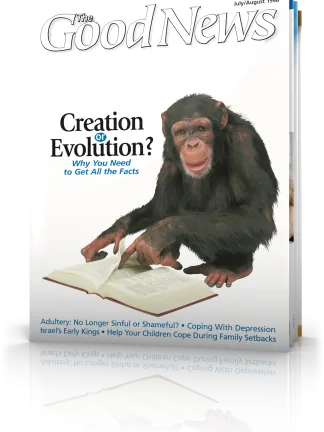Evolution or Creation: Does It Really Matter?
What difference does it make whether we believe in creation or evolution?
What difference does it make whether we believe in creation or evolution?
It seems odd that, only a few generations ago, laws prevented the teaching of evolution in some states in the United States. Now the opposite is true: The Bible is banned from classrooms. Serious discussion of the biblical view of the creation of the universe—and our human origins—is forbidden in public schools.
Why the hostility toward the Bible? Certainly not all scientists agree that there is no Creator and that we are all the product of random chance.
NASA director Wernher von Braun, the "father of the American Space Program," observed: "[Evolutionists] challenge science to prove the existence of God. But must we really light a candle to see the sun? . . . What strange rationale makes some physicists accept the inconceivable electron as real while refusing to accept the reality of a Designer on the ground that they cannot conceive of Him?"
Is evolution true? Curiously enough, our human existence is one of the best arguments against it. According to evolutionary theory, the traits that offer the greatest advantage for survival are passed from generation to generation. Yet human reproduction itself argues powerfully against this fundamental premise of evolution.
If evolution is the guiding force in human development, how is it that higher forms of life evolved with the two sexes? If humans are the pinnacle of the evolutionary process, how is it that our species requires the involvement of a member of each sex to reproduce, when lower forms of life—such as bacteria, viruses and protozoa—are sexless and far more prolific? If they can reproduce by far simpler methods, why can't we? If evolution is true, what went wrong?
Let's take it a step further. If humans are the result of evolution continually reinforcing characteristics that offer a survival advantage while eliminating those that hinder perpetuation, how can we explain a human infant?
Among thousands of species, the newly born (or newly hatched) are capable of survival within a matter of minutes or days. Many never even see their parents. Yet among humans an infant is utterly helpless—not just for days, but for years after birth. A human baby is completely reliant on adults for the nourishment, shelter and care it will need to survive. Meanwhile, caring for that child is a distinct survival disadvantage for adults, since giving of their time and energy lessens their own prospects for survival.
Unfortunately, such obvious flaws in the theory of evolution are too often overlooked. Even Charles Darwin, whose evolutionary theories took the world by storm, had second thoughts. In his later years he reflected on what he had started: "I was a young man with unformed ideas. I threw out queries, suggestions, wondering all the time over everything; and to my astonishment the ideas took like wildfire. People made a religion of them" (emphasis added).
Could man create a religion with no god? The widespread acceptance of evolution shows that we have done just that. The Bible teaches us that God created man. Evolution teaches us that man created God.
If God created man, we have no right to ignore Him. If man created God, we can easily ignore Him. What man has made he can do away with. Thus we are free to act as though God doesn't exist.
Which is the myth, God or evolution? Louis Bounoure, director at the French National Center of Scientific Research, calls evolution "a fairy tale for grown-ups. This theory has helped nothing in the progress of science. It is useless."
Professor Bounoure was wrong about one thing. Rather than being useless, evolution is quite useful if one is bent on the idea of rejecting God.
In this issue The Good News begins a series examining evolution. You can know whether evolution is true. We hope you'll examine the evidence carefully. It does matter. GN




